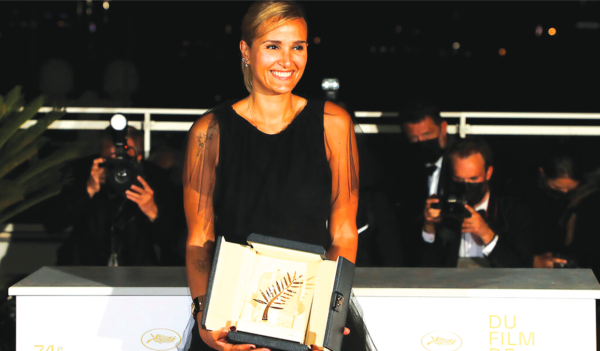
David Prendeville
Another tumultuous year for cinema draws to a close. As we headed into the latter months of 2021 the outlook for cinemas and the film industry in general has been boosted somewhat. Hits such as the much delayed Bond outing No Time to Die have brought people back into the multiplex and given a much needed boost to exhibitors. There have also been other modest successes such as Dune, which suggest that the proclamation of cinema’s death has been greatly exaggerated.
Looking back on the year as a whole it doesn’t feel as though the output of films was much lower than in a normal year. It certainly marked a big improvement on 2020. In 2020 the only really expected money spinner that was released was Christopher Nolan’s dire Tenet, which ultimately underwhelmed at the box office. This year has seen the release of the aforementioned Bond and Dune, as well as hits such as Shang-Chi and the Legend of the Ten Rings, Venom: Let There Be Carnage, Black Widow, F9 and A Quiet Place Part 2, to name but a few.
It’s undeniable that the theatrical grosses of the highest earners are down a bit from where they would have been in the times before Covid. If we look at the US box-office figures for the year, only Shang-Chi and Venom have crossed the 200 million mark, a milestone that would be quietly impressive rather than earth-shattering in the halcyon days of 2018 or 2019. This is offset, of course, by the fact that many films this year were released simultaneously on streaming platforms as they were in cinemas.
At the worldwide box office, it’s two Chinese films that top the pile at the time of writing. The war film The Battle of Lake Changjin is at no.1. The film managed to gross over 800 million in China alone. Second on the list is the comedy Hi, Mom – sadly not the Brian De Palma film from 1970. In at 3 is the ninth instalment of the Fast and Furious franchise, F9, which grossed over 700m worldwide. Bond then takes fourth spot and may add more to its cumulative gross before it finishes its cinema run. The rest of the top ten are made up of Detective Chinatown 3 (an instalment in a popular Chinese franchise), Godzilla Vs Kong, Venom: Let There be Carnage, Shang-Chi, Black Widow and Dune.
Again, we can see in these results, that while grosses are lower than what they would be in a ‘normal’ year, the figures are strong considering the strain the pandemic has put on cinemas and points to a positive outlook for the recovery of theatres in the post Covid era. It’s also particularly heartening that some films that were released on streaming services simultaneously as they were released theatrically, posted strong attendances. This shows that people still value the cinema experience and that simultaneous streaming and theatrical runs have the potential to live in harmony.
In terms of the Hollywood behemoths, there is one more tentpole due to be unleashed before the year’s end. It will be fascinating to see how The Matrix Revolutions plays for a number of reasons, even beyond the pandemic. It’s been 18 years since the last instalment of the franchise and it always felt as though the poor reception given to the two sequels killed off the franchise. Perhaps Warner Bros feel that nostalgia, seemingly the new master of our infantilized world, will be enough to reel punters back in. There seems, however, a curious lack of hype for the 150m budgeted film, less than a month before its release on December 22nd.
Looking back on my own personal highlights of the cinematic year, it maybe does seem a tad more sparse and, perhaps, low-key than what I would consider as the standouts in a normal year, however there has still been much to savour. Prano Bailey-Bond’s Censor was an imaginative and formally inventive meta-horror featuring a superb central performance from Irish actor Niamh Algar. Michel Franco’s provocative New Order was visceral, disturbing and thoroughly uncompromising cinema. Ben Hozie’s PVT Chat was a disarmingly sweet and smart modern romance. Paul Schrader carried on his strong late career form with the enthralling The Card Counter. Todd Haynes made his best film in years with the superb, delightfully cinematic documentary The Velvet Underground, which chronicles the brilliant and iconic band.
That’s also not to mention the raft of exciting 2021 titles that are scheduled to release here over the coming weeks and months, some of them slipping into the following year, as always tends to happen. I greatly look forward to Julia Ducournau’s Palme D’or winning Titane, Gaspar Noe’s Vortex, Joanna Hogg’s The Souvenir Part 2, Paul Verhoeven’s Benedetta and Paul Thomas Anderson’s Licorice Pizza to name but a few.
The latter is likely to be in Oscar contention come the New Year, given Anderson’s track record in gaining nominations from the academy. The films being tipped to compete for this year’s gongs also give a good indication that the steady release of high profile cinema is back in flow. The current favourite for the big awards is Kenneth Branagh’s Belfast, a semi-autobiographical drama about a young boy growing up in 60s Belfast. Other contenders include the Will Smith starrer King Richard, Joel Coen’s The Tragedy of Macbeth, Jane Campion’s The Power of the Dog (currently on release) and Maggie Gyllenhaal’s The Lost Daughter.
All in all, and with everything considered, it has been a pretty decent year for film, with plenty more to look forward to this month and into the New Year. It certainly seems as if Covid has not put paid to the cinematic experience. The strain the pandemic has put on exhibitors is still there to be seen, with some independent cinemas closing their doors permanently. However, it’s clear from the semi-revival of cinemas in the latter part of 2021 that there is hope for better times for cinema owners and cinema-goers alike in the months ahead.



